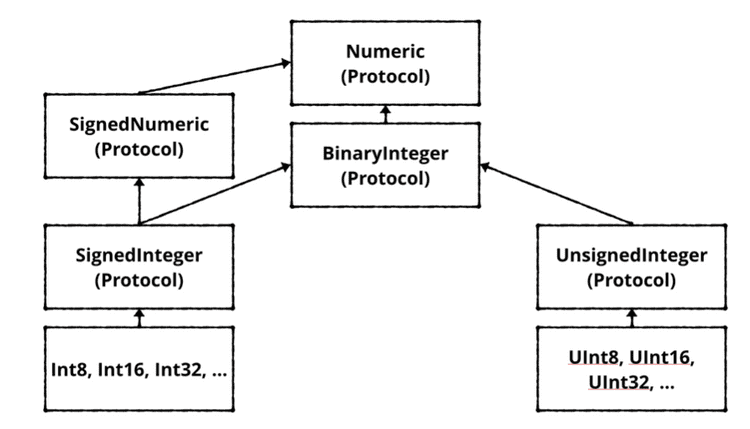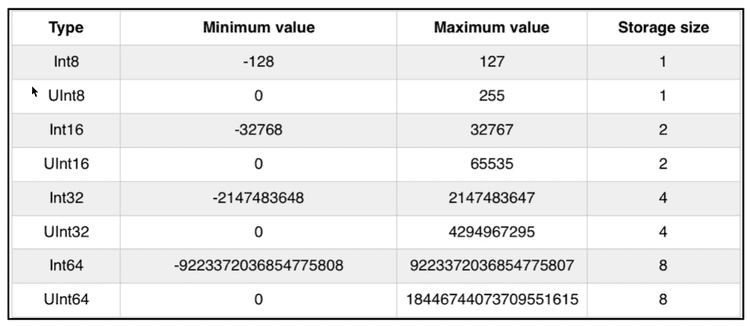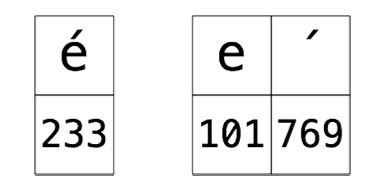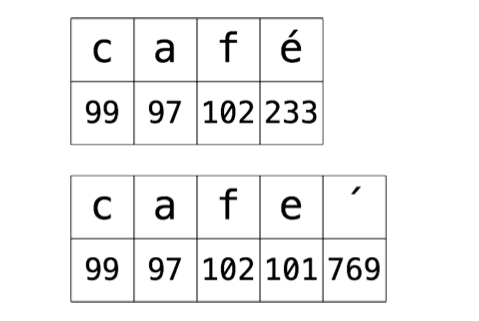$ do
Swift Basics
2019-06-25
基本
注释
// This is a comment. It is not executed./*
This is also a comment.
Over many..
many...
many lines.
*/嵌套注释
/* This is a comment.
/*
And inside it is another comment.
*/
Back to the first.
*/后台打印
print("Hello, Swift Apprentice reader!") // 默认换行
print("\(player), ", terminator: "") // 指定 terminator 为 "", 不换行Math functions
sin(45 * Double.pi / 180) // 0.7071067811865475
cos(135 * Double.pi / 180) // -0.7071067811865475
(2.0).squareRoot() // 1.414213562373095
max(5, 10) // 10
min(-5, -10) // -10常量
let pi: Double = 3.14159变量
var variableNumber: Int = 42
variableNumber = 0
variableNumber += 1
variableNumber /= 1
variableNumber = 1_000_000
var 🐶 💩 : Int = -1 // You can even use the full range of Unicode characters类型转换
var integer: Int = 100
var decimal: Double = 12.5
integer = Int(decimal)
let hourlyRate = 19.5
let hoursWorked = 10
let totalCost = hourlyRate * Double(hoursWorked)类型推导
let typeInferredInt = 42
let typeInferredDouble = 3.14159
let actuallyDouble = Double(3) // 使用类型转换
let actuallyDouble: Double = 3 // 阻止使用类型推导
let actuallyDouble = 3 as Double // 使用 as 做类型转换
let wantADouble = 3.0Integer



Boolean
let yes: Bool = true
let no: Bool = false
let doesOneEqualTwo = (1 == 2)
let doesOneNotEqualTwo = (1 != 2)
let alsoTrue = !(1 == 2)
let isOneGreaterThanTwo = (1 > 2)
let isOneLessThanTwo = (1 < 2)
let and = true && true // 短路
let or = true || false // 短路
let andOr = (1 < 2 && 3 > 4) || 1 < 4
let guess = "dog"
let dogEqualsCat = guess == "cat"
let order = "cat" < "dog" // 按字母表顺序var switchState = true
switchState.toggle() // switchState = false
switchState.toggle() // switchState = trueString
let characterA: Character = "a"
let characterDog: Character = "🐶 "
let stringDog: String = "Dog"
let stringDog = "a" // 类型推导为 String, Swift 中不会推导为 Charactervar message = "Hello" + " my name is "
let name = "Matt"
message += name // "Hello my name is Matt"
let exclamationMark: Character = "!"
message += String(exclamationMark) // "Hello my name is Matt!"插入
message = "Hello my name is \(name)!" // "Hello my name is Matt!"
let oneThird = 1.0 / 3.0
let oneThirdLongString = "One third is \(oneThird) as a decimal."
//One third is 0.3333333333333333 as a decimal.多行
let bigString = """
You can have a string
that contains multiple
lines
by
doing this.
"""
print(bigString)
/*
You can have a string
that contains multiple
lines
by
doing this.
*/
// 会以末尾的 """ 的位置为基线去掉了每行开头的空格字符串的集合特征
Encoding
let characters = "+\u{00bd}\u{21e8}\u{1f643}" // +½⇨🙃
for i in characters.utf8 {
print("\(i) : \(String(i, radix: 2))")
}
// 43 : 101011
//
// 194 : 11000010
// 189 : 10111101
//
// 226 : 11100010
// 135 : 10000111
// 168 : 10101000
//
// 240 : 11110000
// 159 : 10011111
// 153 : 10011001
// 131 : 10000011
for i in characters.utf16 {
print("\(i) : \(String(i, radix: 2))")
}
// 43 : 101011
//
// 189 : 10111101
//
// 8680 : 10000111101000
//
// 55357 : 1101100000111101
// 56899 : 1101111001000011Converting indexes between encoding views
let arrowIndex = characters.index(of: "\u{21e8}")!
characters[arrowIndex] // ⇨
// unicodeScalarsIndex 为 String.UnicodeScalarView.Index 类型
if let unicodeScalarsIndex = arrowIndex.samePosition(in: characters.unicodeScalars) {
characters.unicodeScalars[unicodeScalarsIndex] // 8680
}
// utf8Index 为 String.UTF8View.Index 类型
if let utf8Index = arrowIndex.samePosition(in: characters.utf8) {
characters.utf8[utf8Index] // 226
}
// utf16Index 为 String.UTF16View.Index 类型
if let utf16Index = arrowIndex.samePosition(in: characters.utf16) {
characters.utf16[utf16Index] // 8680
}元组
let coordinates: (Int, Int) = (2, 3)
let coordinatesInts = (2, 3) // Inferred to be of type (Int, Int)
let coordinatesDoubles = (2.1, 3.5) // Inferred to be of type (Double, Double)
let coordinatesMixed = (2.1, 3) // Inferred to be of type (Double, Int)
let x1 = coordinates.0
let y1 = coordinates.1
let coordinatesNamed = (x: 2, y: 3) // Inferred to be of type (x: Int, y: Int)
let x2 = coordinatesNamed.x
let y2 = coordinatesNamed.y
let coordinates3D = (x: 2, y: 3, z: 1)
let (x3, y3, z3) = coordinates3D
//等价于
let coordinates3D = (x: 2, y: 3, z: 1)
let x3 = coordinates3D.x
let y3 = coordinates3D.y
let z3 = coordinates3D.z
let (x4, y4, _) = coordinates3D // _ 表示忽视此部分的值Countable ranges
closed range
let closedRange = 0...5 //(0, 1, 2, 3, 4, 5)half-open range
let halfOpenRange = 0..<5 //(0, 1, 2, 3, 4)open-ended range
确定一个 index, 另一个为 Collection 的开始或结尾
let fullName = "Matt Naff"
let spaceIndex = fullName.index(of: " ")!
let firstName = fullName[..<spaceIndex] // "Matt"条件
if
let hourOfDay = 12
var timeOfDay = ""
if hourOfDay < 6 {
timeOfDay = "Early morning"
} else if hourOfDay < 12 {
timeOfDay = "Morning"
} else if hourOfDay < 17 {
timeOfDay = "Afternoon"
} else if hourOfDay < 20 {
timeOfDay = "Evening"
} else if hourOfDay < 24 {
timeOfDay = "Late evening"
} else {
timeOfDay = "INVALID HOUR!"
}
print(timeOfDay)
let a = 5 let b = 10
let min = a < b ? a : b let max = a > b ? a : bswitch
let number = 10
switch number {
case 0:
print("Zero")
default:
print("Non-zero")
}
let string = "Dog"
switch string {
case "Cat", "Dog":
print("Animal is a house pet.")
default:
print("Animal is not a house pet.")
}let hourOfDay = 12
var timeOfDay = ""
switch hourOfDay {
case 0, 1, 2, 3, 4, 5:
timeOfDay = "Early morning"
case 6, 7, 8, 9, 10, 11:
timeOfDay = "Morning"
case 12, 13, 14, 15, 16:
timeOfDay = "Afternoon"
case 17, 18, 19:
timeOfDay = "Evening"
case 20, 21, 22, 23:
timeOfDay = "Late evening"
default:
timeOfDay = "INVALID HOUR!"
}
// 等价于
switch hourOfDay {
case 0...5:
timeOfDay = "Early morning"
case 6...11:
timeOfDay = "Morning"
case 12...16:
timeOfDay = "Afternoon"
case 17...19:
timeOfDay = "Evening"
case 20..<24:
timeOfDay = "Late evening"
default:
timeOfDay = "INVALID HOUR!"
}
print(timeOfDay)switch number {
case let x where x % 2 == 0:
print("Even")
default:
print("Odd")
}
//等价于
switch number {
case _ where number % 2 == 0:
print("Even")
default:
print("Odd")
}partial matching
let coordinates = (x: 3, y: 2, z: 5)
switch coordinates {
case (0, 0, 0): // 1
print("Origin")
case (_, 0, 0): // 2
print("On the x-axis.")
case (0, _, 0): // 3
print("On the y-axis.")
case (0, 0, _): // 4
print("On the z-axis.")
default: // 5
print("Somewhere in space")
}switch coordinates {
case (0, 0, 0):
print("Origin")
case (let x, 0, 0):
print("On the x-axis at x = \(x)")
case (0, let y, 0):
print("On the y-axis at y = \(y)")
case (0, 0, let z):
print("On the z-axis at z = \(z)")
case let (x, y, z):
print("Somewhere in space at x = \(x), y = \(y), z = \(z)")
}switch coordinates {
case let (x, y, _) where y == x:
print("Along the y = x line.")
case let (x, y, _) where y == x * x:
print("Along the y = x^2 line.")
default:
break
}循环
while
while <CONDITION> {
<LOOP CODE>
}
var sum = 1
while sum < 1000 {
sum = sum + (sum + 1)
}
sum = 1
while true {
sum = sum + (sum + 1)
if sum >= 1000 {
break
}
}while Int.random(in: 1...6) != 6 {
print("Not a six")
}repeat
repeat {
<LOOP CODE>
} while <CONDITION>
var sum = 1
repeat {
sum = sum + (sum + 1)
} while sum < 1000for
for <CONSTANT> in <COUNTABLE RANGE> {
<LOOP CODE>
}
let count = 3
var sum = 0
for i in 1...count {
sum += i
}
// 6
sum = 1 var lastSum = 0
for _ in 0..<count { // 用 _ 忽视 index
let temp = sum
sum = sum + lastSum
lastSum = temp
}
sum = 0
for i in 1...count where i % 2 == 1 { // 遍历 1 to count, 仅当 where 为 true 时执行循环体
sum += i
}
sum = 0
for row in 0..<8 {
if row % 2 == 0 {
continue
}
for column in 0..<8 {
sum += row * column
}
}
// labeled statements
sum = 0
rowLoop: for row in 0..<8 {
columnLoop: for column in 0..<8 {
if row == column {
continue rowLoop
}
sum += row * column
}
}Function
基本
参数
func printMyName() {
print("My name is Matt.")
}
printMyName()
func printMultipleOf(multiplier: Int, andValue: Int) {
print("\(multiplier) * \(andValue) = \(multiplier * andValue)")
}
printMultipleOf(multiplier: 4, andValue: 2)
// 使 external parameter name (方法调用的名字) (and)与方法里使用的名字(value)不同,更语义化
func printMultipleOf(multiplier: Int, and value: Int) {
print("\(multiplier) * \(value) = \(multiplier * value)")
}
printMultipleOf(multiplier: 4, and: 2)
// 用 _ 忽略 external parameter name,更语义化
func printMultipleOf(_ multiplier: Int, and value: Int) {
print("\(multiplier) * \(value) = \(multiplier * value)")
}
printMultipleOf(4, and: 2)
// 默认参数
func printMultipleOf(_ multiplier: Int, _ value: Int = 1) {
print("\(multiplier) * \(value) = \(multiplier * value)")
}
printMultipleOf(4)pass-by-value
// Error: 参数为常量不能修改
func incrementAndPrint(_ value: Int) {
value += 1
print(value)
}
// Error: Left side of mutating operator isn't mutable: 'value' is a 'let' constantcopy-in copy-out
func incrementAndPrint(_ value: inout Int) {
value += 1
print(value)
}
var value = 5
incrementAndPrint(&value)
print(value) // 6pass-by-reference
有时编译器会把 copy-in copy-out 优化为 pass-by-reference, 而不进行 copy 的操作
return
func multiply(_ number: Int, by multiplier: Int) -> Int {
return number * multiplier
}
let result = multiply(4, by: 2)
// 元组
func multiplyAndDivide(_ number: Int, by factor: Int) -> (product: Int, quotient: Int) {
return (number * factor, number / factor)
}
let results = multiplyAndDivide(4, by: 2)
let product = results.product
let quotient = results.quotientNever
func noReturn() -> Never {
} // error: Function with uninhabited return type 'Never' is missing call to another never-returning function on all paths
// Never 表示函数不会返回。
// 上面👆的函数会执行到函数结束会返回,这与 Never 冲突,故报错。
// 于是下面👇的函数就符合 Never 的返回类型
func infiniteLoop() -> Never {
while true { }
}重载
-
不同的参数个数
-
不同的参数类型
-
不同的 external parameter names
-
不同的返回类型
func getValue() -> Int { return 31 } func getValue() -> String { return "Matt" } let value = getValue() // error: ambiguous use of 'getValue()' // Fix let valueInt: Int = getValue() let valueString: String = getValue()
Function 作为变量
func add(_ a: Int, _ b: Int) -> Int {
return a + b
}
func subtract(_ a: Int, _ b: Int) -> Int {
return a - b
}
func printResult(_ function: (Int, Int) -> Int, _ a: Int, _ b: Int) {
let result = function(a, b)
print(result)
}
printResult(add, 4, 2)Closure
没有名字的函数
基本
var multiplyClosure: (Int, Int) -> Intvar multiplyClosure = { (a: Int, b: Int) -> Int in
return a * b
}
let result = multiplyClosure(4, 2)简写
var multiplyClosure: (Int, Int) -> Int
//可以省掉return
multiplyClosure = { (a: Int, b: Int) -> Int in
a*b
}
//可以省掉返回类型
multiplyClosure = { (a: Int, b: Int) in
a*b
}
//可以省掉参数类型
multiplyClosure = { (a, b) in
a*b
}
//可以省掉参数列表
multiplyClosure = {
$0 * $1
}func operateOnNumbers(a: Int, _ b: Int, operation: (Int, Int) -> Int) -> Int {
let result = operation(a, b)
print(result)
return result
}
//使用 Closure
//step 1
let addClosure = { (a: Int, b: Int) in
a + b
}
operateOnNumbers(4, 2, operation: addClosure)
//等价于, 使用普通函数
func addFunction(a: Int, b: Int) -> Int {
return a + b
}
operateOnNumbers(4, 2, operation: addFunction)
//step 2
operateOnNumbers(4, 2, operation: { (a: Int, b: Int) -> Int in
a + b
})
//step 3
operateOnNumbers(4, 2, operation: {
$0 + $1
})
//step 4
operateOnNumbers(4, 2, operation: +)
//当 closure 为最后一个参数时, 使用 trailing closure syntax, 可简写为:
operateOnNumbers(4, 2) {
$0 + $1
}无返回值
let voidClosure: () -> Void = { // 返回值类型的 Void 实际上是 () 的别称, 但参数的 () 不能用 Void
print("Swift is awesome!")
}
voidClosure()闭包
func countingClosure() -> (() -> Int) {
var counter = 0
let incrementCounter: () -> Int = {
counter += 1
return counter
}
return incrementCounter
}
let counter1 = countingClosure()
let counter2 = countingClosure()
counter1() // 1
counter2() // 1
counter1() // 2
counter1() // 3
counter2() // 2Optionals
Swift 对于有值和无值的解决方案。一个 optional 要么包含一个值要么包含 nil,但这个 optional 是存在的
var errorCode: Int? // 用 ? 声明一个 optional 类型的变量
errorCode = 100
errorCode = nilvar result: Int? = 30
print(result) // warning: Expression implicitly coerced from 'Int?' to Any
// Optional(30)
print(result as Any) // To silence the warning
print(result + 1) // error: Value of optional type 'Int?' must be unwrapped to a value of type 'Int'Force unwrapping
var authorName: String? = "Matt"
var authorAge: Int? = 30
var unwrappedAuthorName = authorName! // 使用 ! 强制解包
print("Author is \(unwrappedAuthorName)")
authorName = nil
print("Author is \(authorName!)") // Fatal error: Unexpectedly found nil while unwrapping an Optional value
if authorName != nil {
print("Author is \(authorName!)")
} else {
print("No author.")
}Optional binding
if let unwrappedAuthorName = authorName {
print("Author is \(unwrappedAuthorName)")
} else {
print("No author.")
}
if let authorName = authorName, let authorAge = authorAge {
print("The author is \(authorName) who is \(authorAge) years old.")
} else {
print("No author or no age.")
}
if let authorName = authorName, let authorAge = authorAge, authorAge >= 40 {
print("The author is \(authorName) who is \(authorAge) years old.")
} else {
print("No author or no age or age less than 40.")
}guard
func calculateNumberOfSides(shape: String) -> Int? { // 返回可选类型
switch shape {
case "Triangle":
return 3
case "Square":
return 4
case "Rectangle":
return 4
case "Pentagon":
return 5
case "Hexagon":
return 6
default:
return nil
}
}
func maybePrintSides(shape: String) {
let sides = calculateNumberOfSides(shape: shape)
if let sides = sides {
print("A \(shape) has \(sides) sides.")
} else {
print("I don't know the number of sides for \(shape).")
}
}
// 等价于
func maybePrintSides(shape: String) {
guard let sides = calculateNumberOfSides(shape: shape) else { //guard
print("I don't know the number of sides for \(shape).")
return
}
print("A \(shape) has \(sides) sides.")
}Nil coalescing
var optionalInt: Int? = 10
var mustHaveResult = optionalInt ?? 0 // ?? 为 nil coalescing 操作符
// 等价于
var optionalInt: Int? = 10
var mustHaveResult: Int
if let unwrapped = optionalInt {
mustHaveResult = unwrapped
} else {
mustHaveResult = 0
}Collections
Mutable vs immutable
和普通变量一样,用 let 声明 immutable 集合,用 var 声明 mutable 集合
Array
基本
创建
let evenNumbers = [2, 4, 6, 8] // [Int]
var subscribers: [String] = []
let allZeros = Array(repeating: 0, count: 5) // [0, 0, 0, 0, 0]
let vowels = ["A", "E", "I", "O", "U"]访问
var players = ["Alice", "Bob", "Cindy", "Dan"]
print(players.isEmpty) // false
if players.count < 2 {
print("We need at least two players!")
} else {
print("Let's start!")
}
// Let's start!
var currentPlayer = players.first
print(currentPlayer as Any) // Optional("Alice")
currentPlayer = players.min()
print(currentPlayer as Any) // Optional("Alice")var firstPlayer = players[0] // 不返回 Optional, 返回值
print("First player is \(firstPlayer)") // First player is "Alice"用 Range
let upcomingPlayersSlice = players[1...2] // upcomingPlayersSlice 与 players 共享存储
print(upcomingPlayersSlice[1], upcomingPlayersSlice[2]) // "Bob Cindy\n"
let upcomingPlayersArray = Array(players[1...2]) // 产生一个新数组 upcomingPlayersArray
print(upcomingPlayersArray[0], upcomingPlayersArray[1]) // "Bob Cindy\n"contains
func isEliminated(player: String) -> Bool {
return !players.contains(player)
}
print(isEliminated(player: "Bob")) // > false
players[1...3].contains("Bob") // true修改
Append
players.append("Eli") // append 非 string, 将报错
players += ["Gina"] // += 也可以 append
print(players) // ["Alice", "Bob", "Cindy", "Dan", "Eli", "Gina"]Insert
players.insert("Frank", at: 5)Remove
var removedPlayer = players.removeLast()
print("\(removedPlayer) was removed") // Gina was removed
removedPlayer = players.remove(at: 2)
print("\(removedPlayer) was removed") // Cindy was removed
players.removeAll() // players is now an empty arrayUpdate
players = ["Alice", "Bob", "Dan", "Eli", "Frank"]
players[4] = "Franklin"
print(players) // ["Alice", "Bob", "Dan", "Eli", "Franklin"]
players[0...1] = ["Donna", "Craig", "Brian", "Anna"] // players 0, 1 两个元素 update 为 4个元素
print(players) // ["Donna", "Craig", "Brian", "Anna", "Dan", "Eli", "Franklin"]Move
let playerAnna = players.remove(at: 3)
players.insert(playerAnna, at: 0)
print(players) // ["Anna", "Donna", "Craig", "Brian", "Dan", "Eli", "Franklin"]
players.swapAt(1, 3)
print(players) // ["Anna", "Brian", "Craig", "Donna", "Dan", "Eli", "Franklin"]
players.sort()
print(players) // ["Anna", "Brian", "Craig", "Dan", "Donna", "Eli", "Franklin"]
//可以使用 sorted() 代替 sort() 来不影响原数组,产生一个排好序的新数组遍历
for player in players {
print(player)
}
for (index, player) in players.enumerated() {
print("\(index + 1). \(player)")
}截取
var prices = [1.5, 10, 4.99, 2.30, 8.19]
let removeFirst = prices.dropFirst() // [10, 4.99, 2.30, 8.19]
let removeFirstTwo = prices.dropFirst(2) // [4.99, 2.30, 8.19]
let removeLast = prices.dropLast() // [1.5, 10, 4.99, 2.30]
let removeLastTwo = prices.dropLast(2) // [1.5, 10, 4.99]
let firstTwo = prices.prefix(2) // [1.5, 10]
let lastTwo = prices.suffix(2) // [2.30, 8.19]Dictionaries
基本
创建
var namesAndScores = ["Anna": 2, "Brian": 2, "Craig": 8, "Donna": 6] // [String: Int]
print(namesAndScores) // ["Craig": 8, "Anna": 2, "Donna": 6, "Brian": 2] // 无序
namesAndScores = [:] // 空字典
var pairs: [String: Int] = [:] // 必须声明类型,空字典无法类型推导
pairs.reserveCapacity(20) // 定义字典容量, 可改善性能访问
namesAndScores = ["Anna": 2, "Brian": 2, "Craig": 8, "Donna": 6]
print(namesAndScores["Anna"]!) // 2 // 返回 optional
namesAndScores["Greg"] // nil
namesAndScores.isEmpty // false
namesAndScores.count // 4
// 使用 isEmpty 而不使用 count == 0, 可改善性能, 因为 count 会遍历字典修改
Add
var bobData = [
"name": "Bob",
"profession": "Card Player",
"country": "USA"
]
bobData.updateValue("CA", forKey: "state")
bobData["city"] = "San Francisco"Update
bobData.updateValue("Bobby", forKey: "name") // Bob // 会返回旧值, key 不存在则添加, 返回 nil
bobData["profession"] = "Mailman"Remove
bobData.removeValue(forKey: "state")
bobData["city"] = nil // 会删除 city; 若不想删除要保留 city, 其值为 nil, 用 updateValue遍历
for (player, score) in namesAndScores {
print("\(player) - \(score)")
}
// Craig - 8
// Anna - 2
// Donna - 6
// Brian - 2
for player in namesAndScores.keys {
print("\(player), ", terminator: "") // no newline
}
print("") // print one final newline
// Craig, Anna, Donna, Brian,Set
基本
创建
let setOne: Set<Int> = [1] // 必须指定类型
let someArray = [1, 2, 3, 1] // 此为数组
var explicitSet: Set<Int> = [1, 2, 3, 1]
var someSet = Set([1, 2, 3, 1])
print(someSet) // [2, 3, 1] 无序访问
print(someSet.contains(1)) // true
print(someSet.contains(4)) // false修改
insert
someSet.insert(5)remove
let removedElement = someSet.remove(1)
print(removedElement!) // 1使用 Closure
操作
let names = ["ZZZZZZ", "BB", "A", "CCCC", "EEEEE"]
// sorted
names.sorted() // ["A", "BB", "CCCC", "EEEEE", "ZZZZZZ"]
names.sorted {
$0.count > $1.count
} // ["ZZZZZZ", "EEEEE", "CCCC", "BB", "A"]
// contains
names.contains("BB") //true
names.contains {
$0 == "BB"
} // true遍历 (函数式编程)
let values = [1, 2, 3, 4, 5, 6]
values.forEach {
print("\($0): \($0*$0)")
}
var prices = [1.5, 10, 4.99, 2.30, 8.19]
let largePrices = prices.filter {
return $0 > 5
} // [10, 8.19]
let larePrice = prices.first {
$0 > 5
} // 10
let salePrices = prices.map {
return $0 * 0.9
} // [1.35, 9, 4.491, 2.07, 7.371]
let userInput = ["0", "11", "haha", "42"]
let numbers1 = userInput.map {
Int($0)
} // [0, 11, nil, 42] // 为 Int? 的数组
let numbers2 = userInput.compactMap {
Int($0)
} // [0, 11, 42] // 为 Int 的数组, 去除 missing values
let sum = prices.reduce(0) {
return $0 + $1
} // 26.98
// 用于字典
let stock = [1.5: 5, 10: 2, 4.99: 20, 2.30: 5, 8.19: 30] // 单价:数量
let stockSum = stock.reduce(0) {
return $0 + $1.key * Double($1.value)
} // 384.5
// reduce(into:_:)
// reduce a collection into an array or dictionary,
let farmAnimals = ["🐎 ": 5, "🐄 ": 10, "🐑 ": 50, "🐶 ": 1]
let allAnimals = farmAnimals.reduce(into: []) {
(result, this: (key: String, value: Int)) in
for _ in 0 ..< this.value {
result.append(this.key)
}
}String as Collection
let string = "Matt"
for char in string {
print(char)
}
let stringLength = string.count
let fourthChar = string[3] // error: 'subscript' is unavailable: cannot subscript String with an Int, see the documentation comment for discussionGrapheme clusters

let cafeNormal = "café"
let cafeCombining = "cafe\u{0301}"
cafeNormal.count // 4
cafeCombining.count // 4
cafeNormal.unicodeScalars.count // 4
cafeCombining.unicodeScalars.count // 5
for codePoint in cafeCombining.unicodeScalars {
print(codePoint.value)
}
//99
//97
//102
//101
//769Indexing Strings
let firstIndex = cafeCombining.startIndex // firstIndex 为 String.Index 类型, 而非 Integer
let firstChar = cafeCombining[firstIndex] // c // firstChar 为 Character 类型
let lastIndex = cafeCombining.endIndex
let lastChar = cafeCombining[lastIndex] // Fatal error: String index is out of bounds
let lastIndex = cafeCombining.index(before: cafeCombining.endIndex)
let lastChar = cafeCombining[lastIndex] // é
let fourthIndex = cafeCombining.index(cafeCombining.startIndex, offsetBy: 3)
let fourthChar = cafeCombining[fourthIndex] // é
fourthChar.unicodeScalars.count // 2
fourthChar.unicodeScalars.forEach { codePoint in
print(codePoint.value)
}
//101
//769Equality with combining characters

// canonicalization: 将两边转换成相同方式 (using the single character or using the combining character), 在做比较或计算字符串长度
let equal = cafeNormal == cafeCombining // truebi-directional collections
let name = "Matt"
let backwardsName = name.reversed()
// backwardsName 为 ReversedCollection<String> 类型, 而非 String, swift 所做的优化
let secondCharIndex = backwardsName.index(backwardsName.startIndex, offsetBy: 1)
let secondChar = backwardsName[secondCharIndex] // "t"
let backwardsNameString = String(backwardsName) // 将创建一个新的字符串, backwardsNameString 为 String 类型Substrings
let fullName = "Matt Naff"
let spaceIndex = fullName.index(of: " ")!
let firstName = fullName[fullName.startIndex..<spaceIndex] // "Matt"
//等价于
let firstName = fullName[..<spaceIndex] // "Matt"
let lastName = fullName[fullName.index(after: spaceIndex)...] // "Naff"
// firstName, lastName 为 String.SubSequence (Substring 的别称) 类型, 而非 String 类型, Swift的优化,此时 firstName, lastName 与原来的字符串共享内存, 并不分配新内存, 节省了内存使用
let lastNameString = String(lastName) // 此时才会分配新内存